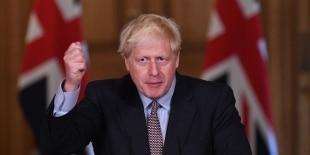Brexit: GB government presents law revising agreements.
EU convenes extraordinary session
Brexit, EU Commission: London withdraws bill, undermines mutual trust
Brexit, Paris and Berlin are calling for compliance with EU rules
Share
15 September 2020The conservative premier, Boris Johnson, wins the first vote of the municipalities on the highly contested bill, "the Internal Market Bill" which wants to call into question, through a national law, the withdrawal agreement already reached by London and Brussels on Brexit, constituting an - explicit - violation of international law.
In particular, the trade and customs status of Northern Ireland is called into question.
Johnson's choice infuriated the EU, jeopardizing the ongoing trade negotiations.
Yesterday evening was the first of a series of votes in the British Parliament.
British Prime Minister Boris Johnson defended his plan to unilaterally rewrite the post-Brexit deal with the EU as an "insurance policy against the bloc's unreasonable behavior".
For the premier, a law designed to ignore parts of the Brexit withdrawal agreement was necessary because the EU could "go to extreme and unreasonable measures" in its treatment of Britain, he said.
The British premier has in fact accused Brussels of wanting to impose a food "freeze" that would effectively divide the United Kingdom.
The European Union, which has repeatedly denied, according to Boris Johnson, threatens to establish a border between Northern Ireland and the rest of the UK if London does not accept its terms regarding the post-Brexit trade deal. .
However, the bill has aroused strong discontent even within the conservative party.
The measure passed with 340 yes and 263 no, the majority was crippled by various abstentions which suggests a game perhaps still open in the next stages of the process.
Former Minister Bob Neill announced an amendment that would veto all passages of the law incompatible with international law, defusing (or downsizing) the proposal's impact on relations with international partners.
The next appointment is next Tuesday, September 22, when the text will go to committee, where it will be examined line by line before the third reading, final to the Municipalities, after which it will pass to the House of Lords.

